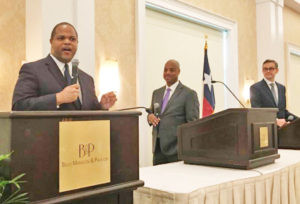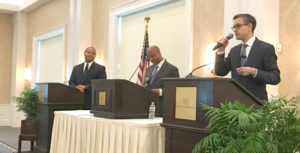By Bill Zeeble/KERA News

After a packed field of nine candidates, it’s now down to two for Dallas mayor: State Rep. Eric Johnson, who got the most votes in the general election, and Dallas City Council member Scott Griggs, who came in a close second.
Early voting runs through June 4. Election Day is June 8.
On issues big or small, the candidates often agree on what Dallas needs, just not necessarily on how to get there.
Griggs and Johnson both speak passionately of growing both the economy and an educated workforce. That would boost the city’s tax base, which in turn could pay for more police, fix potholes and upgrade recreation centers.
Though all are important, only one would cause Griggs to lose sleep — public safety.
“This month of May, we’ve had more murders than days in the month of May,” Griggs said in a runoff debate. “We’re down to 2,900 police officers. Before the pension crisis, we had 3,600 police officers.
“I served on the Dallas and Fire pension system, helped uncover the corruption and then helped put together a solution to save the pension system. In that process we had so many police officers retire. That’s what keeps me up.”
Johnson says public safety is important. But he offered up what he considers an even bigger and tougher challenge: the persistent, grinding poverty he said has devastated Dallas far too long.
“Those are problems that take years to solve,” Johnson said. “You have to make very important decisions to put things in place that you may never get credit for. But it is my most important goal to put our city on a track where the southern part of the city and northern part of the city are indistinguishable from one another.”
For Griggs, bringing varied parts of Dallas together starts with seemingly easy stuff like maintaining streets. But he said that’s harder than it sounds. It takes an insider’s experience like his — gained over eight years on the council while serving parts of Oak Cliff.
“We need to fix our streets right the first time,” Griggs said at a campaign forum in March. “We give them to the lowest bidder. That’s why after they’re fixed, they fall apart. It doesn’t make any sense.
“It’s not only the price that matters. You’re going to finish by a certain time or else we’re going to financially penalize you. If you’ve done bad work in the past, let’s don’t give them any more contracts.”
Johnson, who’s represented parts of Dallas and Mesquite in the Texas House since 2010, says too many big city issues need teams to tackle them. Putting coalitions together, he said, is his strength.
“The most important type of experience is not necessarily the substance, it’s actually the style,” Johnson said in a recent debate.
He said his experience in Austin has taught him to be a collaborative leader. “My reputation is that I work very well with from both sides of the aisle and from different parts of our state, and that’s something,” he said. “I’ll continue as mayor. What I’ve been for the past 10 years is someone who consistently has gone out of his way to work with others.”
Johnson has stressed his skill at consensus building throughout the campaign. That sets him apart, he says, from Griggs, whom he and others say is divisive.
“Together the city is moving in the right direction,” Johnson says. “Things are good in Dallas, don’t be fooled. But we can’t get there sniping at each other and fighting with each other all the time, and those days are behind us. Soon enough they’ll be behind us.”

Griggs not only rejects the “divider” label but says his city hall experience is what the job requires, not Johnson’s experience in the state house.
“I work with everyone on the city council,” Griggs said. “I have a thick skin and big heart, which is what it takes to be a leader here in the city of Dallas. And too often people label common sense as divisiveness.
“For years I was called divisive because I didn’t want to build a toll road over the Trinity River. They said that was divisive. It’s actually just common sense.”
